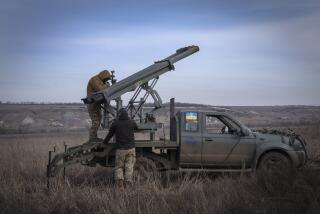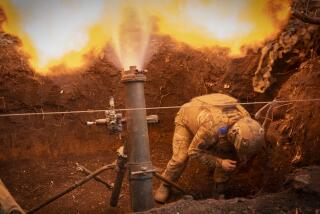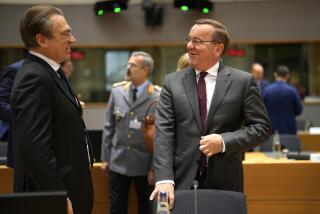Raising 17,000 New Questions
- Share via
In two days the 22 nations of the North Atlantic Treaty Organization and the Warsaw Pact are scheduled to sign an agreement for the largest conventional arms cuts in history. The numbers involved are staggering.
Tens of thousands of weapons--tanks, artillery pieces, armored personnel carriers, fixed-wing aircraft and helicopters--will disappear from Europe, an outward and visible sign that a new era of greater trust and security has dawned over a Continent so long riven by a costly and perilous ideological conflict.
A disturbing element of uncertainty, however, threatens to cloud this new dawn. The Soviet Union, by moving early to withdraw a great deal of combat equipment from the territory of its erstwhile Warsaw Pact allies, has substantially reduced the number of its weapons that must be destroyed or militarily deactivated--without, necessarily, significantly reducing its overall arsenal.
Almost 17,000 tanks, for example, have already been shipped across the Urals to Soviet Asia and so are not subject to the provisions of the Conventional Forces in Europe treaty. The status of those tanks and other heavy weapons moved to Siberia seems certain to be raised as a point of contention when the CFE treaty goes to the Senate for ratification.
Some U.S. officials suggest that the stored weapons are no danger to NATO. Much of the equipment is apparently being left out in the open where the elements will soon get to it.
Still, an estimated 16,800 Soviet tanks, 15,000 other armored vehicles and 20,000 artillery pieces that had earlier been headed for destruction have been shifted and so escaped the scrap heap.
Some may indeed be left to rust, but Washington has asked for an accounting on these weapons and is awaiting a Soviet response. The Senate almost surely will demand such an accounting and seek clear assurances about the weapons’ future before it agrees to ratify the CFE treaty.
A very real, very serious issue of Soviet good faith has been raised. It must be promptly addressed, for much more than the CFE treaty may depend on getting satisfactory answers.
More to Read
Sign up for Essential California
The most important California stories and recommendations in your inbox every morning.
You may occasionally receive promotional content from the Los Angeles Times.













